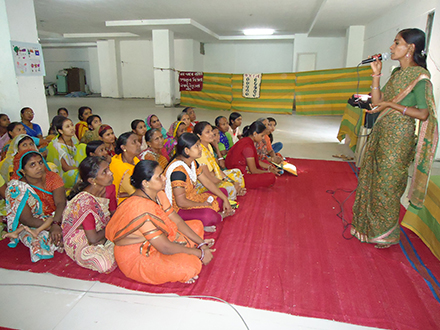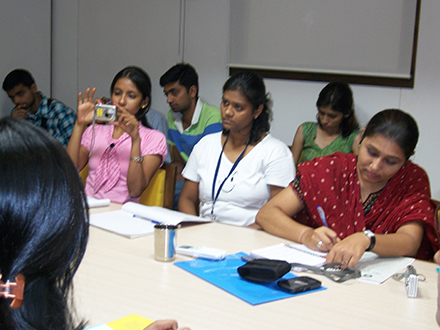Our Work
We educate women and girls in four major areas: skills training, literacy, research, and communication.
Skills Training
We believe that every woman has potential and ability, but due to adverse circumstances, many women in the informal economy cannot reach their goals.
Our training programmes take a wholistic approach to students’ overall development by
—Increasing their employability
—Preventing their entrance into low-paid, unskilled employment
—Promoting their upward mobility
—Improving their status as workers
—Building their confidence
—Encouraging a collective approach to organizing through capacity building.
By learning to identify problems and take action to address them, students develop new skills and see their own capacity to be leaders in their homes, their communities, and in society.
Students also learn the power of organization and the importance of acting collectivelyas workers and as SEWA members to achieve their goals.
Our programmes provide women with opportunities for introspection and sharing, which leads to learning how to improve their own situations.


Literacy
Our literacy students may come from villages and cities and vary in their literacy skills, but they are united in their desire to learn.
Our literacy programs recognize literacy means different things for different groups. For example, literacy might mean something different to a home-based worker than it does to a street vendor.
Literacy also means becoming literate in terms of social issues, government resources, and the digital world.
Research
Our research has played a vital role for SEWA since its inception. Our research helps SEWA do the following:
—Understand the socio-economic conditions of and concerns for women in the informal economy
—Document the history of women’s struggles for economic and social security
—Evaluate SEWA’s interventions and campaigns
—Bring research findings into the mainstream.
Through our research, we build the capacity of our members by providing grassroots-researcher training, which gives them self-confidence and marketable skills. Because they are ideally placed to reach out to informal women workers, our members are an integral part of the research team. They help SEWA achieve more reliable results.
We also act as research partners with other organisations and can aid research in a variety of ways. Recent partnerships include work with the following organizations:
—Samarth, in order to evaluate success of Hepatitis B education campaigns.
—Association for Stimulating Know How (ASK),in order to enumerate a householder survey around toilet access.
—Women in Informal Employment: Globalizing and Organizing (WIEGO),on how technology impacts the working poor.
—SEWA Bank, conducting a needs assessment.
If your organisation is interested in working with IASEW in research, please contact us.


Communication
IASEW Communications connects self-employed women to each other, to the public, to policy makers, and to government officials.
Through our communications platforms, like Anasooya Magazine, Akashganga Magazine, e-newsletters, Video SEWA,andRudi no Radio, we can provide workers space to be seen and heardand we can educate workers on the issues that affect their lives, including
—Legal concerns
—Health promotion
—Nutrition education
—Government Policies and Programmes for the Self-Employed awareness
—National Development Plans and Programs.
We also produce videos for other organisations. For more information, please contact us.

